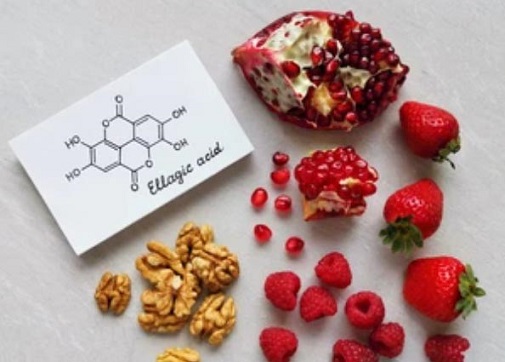Thailand medical researchers discover that ellagic acid can help against HPV infections in women
Nikhil Prasad Fact checked by:Thailand Medical News Team Aug 02, 2024 1 year, 6 months, 3 weeks, 5 days, 14 hours, 1 minute ago
Thailand Medical News: Researchers Explore Potential of Plant-Derived Compound in Enhancing Vaginal Immunity
In an exciting breakthrough, a team of researchers has discovered that ellagic acid, a natural compound found in many fruits and plants, can significantly enhance the body's innate immune response in the vaginal region. This
Thailand Medical News report delves into the study's findings, exploring how this compound could potentially aid in defending against Human Papillomavirus (HPV) infections.
 Thailand medical researchers discover that ellagic acid can help against HPV infections in women
What is Ellagic Acid?
Thailand medical researchers discover that ellagic acid can help against HPV infections in women
What is Ellagic Acid?
Ellagic acid is a phenolic compound known for its anti-inflammatory, antioxidant, and anti-cancer properties. Commonly found in fruits like strawberries, raspberries, and pomegranates, this compound has been the subject of numerous studies due to its wide-ranging health benefits.
The Study at a Glance
This study, conducted by researchers from Princess of Naradhiwas University in Thailand, Kasetsart University in Bangkok, the University of Washington in Seattle, and Burapha University in Chonburi, Thailand, aimed to investigate the effects of ellagic acid on vaginal innate immunity and its potential to inhibit HPV16 pseudovirus infection. The study findings revealed significant immune-boosting properties of ellagic acid, offering hope for new preventative measures against HPV-related cervical cancer.
Enhancing Vaginal Innate Immunity
The human vaginal epithelium, the first line of defense against pathogens, is crucial in preventing infections. The study found that ellagic acid significantly increases the production of human beta-defensin 2 (hBD2) and secretory leukocyte protease inhibitor (SLPI), both of which are vital antimicrobial peptides. These peptides help in combating various pathogens, including bacteria, fungi, and viruses.
hBD2 Production
The study showed a remarkable increase in hBD2 levels in vaginal epithelial cells treated with ellagic acid. At a concentration of 12.5 µM, hBD2 mRNA levels increased by an average of 2.9-fold, and protein levels by 7.1-fold. This increase suggests that ellagic acid can boost the vaginal immune response, making it more effective against infections.
SLPI Production
While SLPI mRNA levels increased significantly at higher concentrations of ellagic acid, the protein levels did not show a similar increase. This discrepancy indicates that while ellagic acid stimulates SLPI gene expression, the translation into protein might be regulated differently.
Cytokine and Chemokine Secretion
In addition to antimicrobial peptides, the study also measured the secretion of various cytokines and chemokines, which play a critical role in the immune response. The researchers found that ellagic acid specifically induced the secretion of
interleukin-2 (IL-2) in a dose-dependent manner. IL-2 is essential for the proliferation of T cells, which are crucial for immune defense.
Inhibition of HPV16 Infection
While the study primarily focused on the immune-boosting properties of ellagic acid, it also explored its potential to inhibit HPV16 infection. The results showed a slight trend towards inhibition during the pre-attachment phase of the virus to host cells, although this effect was not statistically significant. This indicates that while ellagic acid may have some antiviral properties, further research is needed to fully understand its potential in preventing HPV infections.
Safety and Cytotoxicity
One of the crucial aspects of any potential treatment is its safety profile. The study confirmed that ellagic acid is not cytotoxic to vaginal epithelial cells at the concentrations tested. Cell viability remained above 85% across all tested conditions, indicating that ellagic acid is safe for use in further studies and potential therapeutic applications.
Future Implications
The findings from this study open up exciting possibilities for the use of ellagic acid as a natural agent to enhance vaginal immunity. The ability of ellagic acid to increase the production of key antimicrobial peptides and cytokines suggests that it could be developed into a topical treatment to prevent infections and maintain vaginal health.
Conclusion
This research sheds light on the promising role of ellagic acid in enhancing the body's natural defenses against pathogens in the vaginal region. While further studies are needed to fully understand its potential and efficacy, these findings pave the way for new, natural approaches to preventing HPV-related diseases.
The study findings were published in the peer-reviewed journal: Molecules.
https://www.mdpi.com/1420-3049/29/15/3630
For the latest on HPV, keep on logging to
Thailand Medical News.
Read Also:
https://www.thailandmedical.news/news/combination-of-four-natural-supplements-can-tackle-persistent-hpv-infections
https://www.thailandmedical.news/news/most-people-not-aware-about-hpv-or-its-cancer-causing--effects-despite-hpv-related-cancers-increasing-worldwide-
